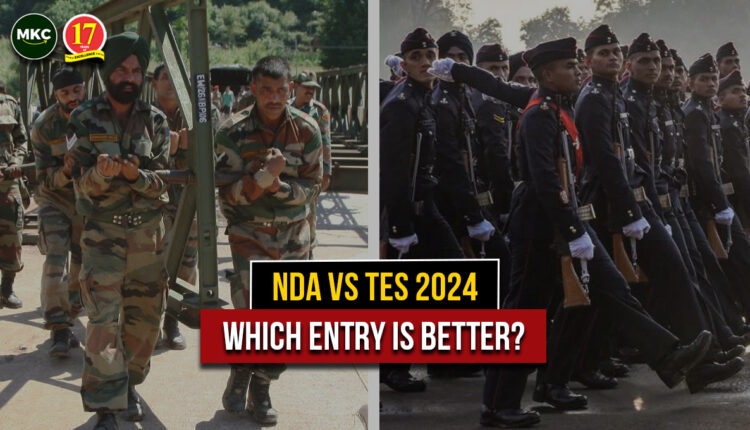Read the detailed analysis of NDA Vs TES: Which Entry is Better? Check details related to NDA and TES Entries here in the article.
NDA vs TES: Which Entry is Better: NDA (National Defence Academy) and TES (Technical Entry Scheme) are two prominent options for 12th-passed or appearing candidates aiming to join the Indian Armed Forces as officers. In this article, we’ll compare NDA and TES and understand their advantages and disadvantages along with other important information.
NDA – National Defence Academy Exam
Table of Contents
The NDA exam, conducted by the Union Public Service Commission (UPSC), is a prestigious and competitive examination for admission to the Indian Armed Forces. It serves as the gateway to the Indian Army, Navy, and Air Force. The exam, held twice a year, is open to male candidates who have passed the 10+2 examination. The selection process involves a written examination followed by an interview conducted by the Services Selection Board (SSB).
Eligibility for NDA Exam
To understand the NDA Exam, it’s important to understand the eligibility criteria set forth by the Union Public Service Commission (UPSC) for both male and female candidates. These criteria are the foundation for selecting candidates with the qualifications and attributes to excel in the Indian Armed Forces. Let’s explore the eligibility criteria in detail.
| Particulars | Details |
|---|---|
| Age | Candidates should be between 16.5 to 19.5 years old. |
| Educational Qualification | 12th Class pass with specified subjects or equivalent examination. |
| Written Exam Pattern | Mathematics (120 questions, 300 marks) |
| GAT (General Ability Test) – English, GK, Basic Science (150 questions, 600 marks) | |
| SSB Interview | 900 Marks |
TES – Technical Entry Scheme
The TES program, offered by the Indian Army, recruits technically skilled individuals as commissioned officers. It’s open to male candidates who have completed their 10+2 with Physics, Chemistry, and Mathematics. Selected candidates undergo rigorous training and are commissioned as Lieutenants in the Indian Army.
Technical Entry Scheme Details
Before diving into the specifics of the Technical Entry Scheme (TES), it’s crucial to grasp the essence of this specialized program offered by the Indian Army. TES serves as a pathway for technically skilled individuals to embark on a fulfilling journey as commissioned officers. Let’s explore the key details of the Technical Entry Scheme.
| Particulars | Details |
|---|---|
| Educational Qualification | 10+2 with specified subjects and 60% aggregate marks, plus JEE Mains Exam. |
| Age Limit | Between 16.5 to 19.5 years old. |
| Training Duration | 1 year of basic training. |
| Nature of Commission | Permanent Commission. |
| Rank at Commissioning | Lieutenant. |
| Recruitment Process | SSB Interview, Medical Test, Documentation. |
| Salary | Basic Pay of ₹56,100. |
NDA VS TES
When considering the NDA (National Defence Academy) versus TES (Technical Entry Scheme), candidates must weigh several factors to make an informed decision. NDA, administered by the Union Public Service Commission (UPSC), is a prestigious examination that opens avenues to join the Army, Navy, and Air Force as officers. It offers a comprehensive training regimen at the National Defence Academy, grooming candidates in a broad spectrum of skills. On the other hand, TES provides a direct entry route for technically inclined individuals, focusing on specialized training in technical fields within the Indian Army. While NDA offers diverse career paths and generalist training, TES emphasizes specialized technical skills and a more focused career trajectory. Ultimately, choosing between NDA and TES depends on individual preferences, career aspirations, and aptitudes.
| Criteria | NDA | TES |
|---|---|---|
| Entry Process | Conducted by UPSC. | Direct entry, no written exam. |
| Eligibility | 12th pass, no minimum marks required. | 60% aggregate marks in 12th, plus JEE Mains. |
| Opportunities | Army, Navy, Air Force. | Primarily Army. |
| Training | National Defence Academy (3 years). | OTA Gaya (1 year). |
| Career Options | Diverse career paths. | Limited to technical roles. |
| Skill Specialization | Generalist training. | Specialized technical skills. |
Conclusion
In conclusion, both NDA and TES have their merits and drawbacks. NDA offers a broader spectrum of career opportunities and generalist training, while TES provides specialized technical skills and a direct entry route. The choice between the two entries ultimately depends on individual preferences and career aspirations. Aspiring candidates are advised to carefully consider their interests and goals before making a decision.








